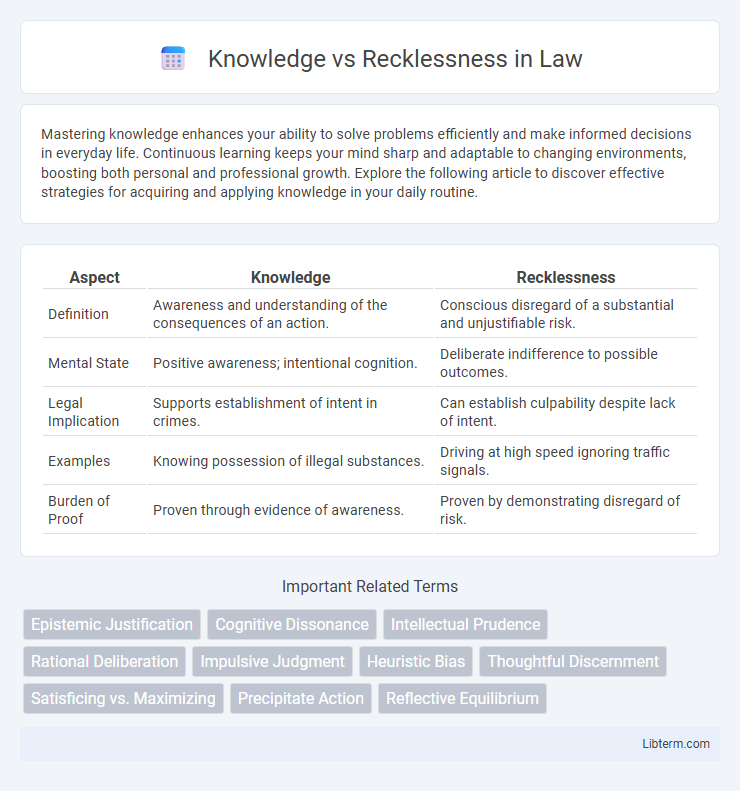Mastering knowledge enhances your ability to solve problems efficiently and make informed decisions in everyday life. Continuous learning keeps your mind sharp and adaptable to changing environments, boosting both personal and professional growth. Explore the following article to discover effective strategies for acquiring and applying knowledge in your daily routine.
Table of Comparison
| Aspect | Knowledge | Recklessness |
|---|---|---|
| Definition | Awareness and understanding of the consequences of an action. | Conscious disregard of a substantial and unjustifiable risk. |
| Mental State | Positive awareness; intentional cognition. | Deliberate indifference to possible outcomes. |
| Legal Implication | Supports establishment of intent in crimes. | Can establish culpability despite lack of intent. |
| Examples | Knowing possession of illegal substances. | Driving at high speed ignoring traffic signals. |
| Burden of Proof | Proven through evidence of awareness. | Proven by demonstrating disregard of risk. |
Understanding Knowledge: Foundations and Importance
Understanding knowledge involves recognizing it as the structured accumulation of verified information, skills, and experiences that enable informed decision-making and problem-solving. Foundational elements such as critical thinking, empirical evidence, and continuous learning distinguish knowledge from mere assumption or guesswork. The importance of knowledge lies in its capacity to reduce errors, enhance innovation, and promote sustainable outcomes across personal and professional domains.
Defining Recklessness: Traits and Consequences
Recklessness is characterized by a disregard for potential risks and consequences, often manifesting in impulsive decisions and unsafe behaviors. Traits include overconfidence, lack of foresight, and failure to consider outcomes, leading to harmful or dangerous situations. Consequences of recklessness range from personal injury and legal penalties to damage in professional or social relationships.
The Thin Line Between Confidence and Recklessness
Confidence stems from a foundation of knowledge, providing clarity in decision-making and measured risk-taking. Recklessness emerges when confidence surpasses understanding, leading to impulsive actions without adequate assessment. The thin line between confidence and recklessness lies in the ability to balance informed judgment with courage, ensuring risks are calculated rather than blindly embraced.
How Knowledge Informs Wise Decision-Making
Knowledge enhances wise decision-making by providing a solid foundation of facts, context, and experience essential for evaluating options and potential outcomes accurately. Understanding relevant data and past lessons reduces uncertainty, enabling decisions that align with long-term goals rather than impulsive reactions. Wise decisions stem from applying critical thinking to informed insights, minimizing risks associated with recklessness and maximizing positive results.
The Dangers of Acting Without Knowledge
Acting without knowledge increases the risk of costly mistakes and unforeseen consequences in both personal and professional spheres. Recklessness often leads to poor decision-making, which can result in financial losses, safety hazards, and damaged reputations. Understanding and gathering relevant information reduces uncertainty, enabling informed decisions that minimize risk and enhance outcomes.
Real-world Examples: Knowledge vs Recklessness
In the 2008 financial crisis, knowledge-based decision-making by regulators and banks could have prevented reckless lending practices that led to economic collapse. Elon Musk's strategic use of engineering knowledge to innovate electric vehicles contrasts sharply with reckless attempts by some startups that ignored safety standards, resulting in product failures. The Chernobyl disaster exemplifies the catastrophic consequences of reckless disregard for safety protocols, while well-informed NASA missions highlight the power of thorough knowledge in achieving groundbreaking space exploration.
Cognitive Biases: Fueling Reckless Choices
Cognitive biases such as overconfidence and confirmation bias often skew judgment, causing individuals to overestimate their knowledge while underestimating risks, fueling reckless decisions. Lack of awareness about these mental shortcuts leads to ignoring critical information, resulting in impulsive and poorly informed choices. Recognizing and mitigating cognitive biases is essential to transforming recklessness into informed, rational behavior.
Cultivating a Knowledge-Driven Mindset
Cultivating a knowledge-driven mindset involves prioritizing informed decision-making and continuous learning to minimize risks associated with recklessness. Emphasizing critical thinking and evidence-based strategies enhances problem-solving abilities and fosters long-term success. Organizations that invest in knowledge management systems consistently outperform those relying on impulse, demonstrating the tangible benefits of a disciplined intellectual approach.
Preventing Recklessness: Practical Strategies
Implementing structured decision-making frameworks and fostering critical thinking skills effectively prevent recklessness by encouraging thorough analysis and risk assessment. Encouraging continuous education and real-world experience builds knowledge that guides safer choices in complex situations. Establishing accountability systems and promoting open communication within teams further reduce impulsive actions and enhance responsible behavior.
Striking the Balance: When to Act and When to Learn
Striking the balance between knowledge and recklessness requires discerning when to act decisively and when to prioritize learning for informed decisions. Effective risk management hinges on accumulating relevant information and adapting strategies based on new insights, while avoiding impulsive actions that undermine long-term goals. Cultivating situational awareness allows individuals and organizations to leverage knowledge for calculated risks, enhancing success and minimizing costly mistakes.
Knowledge Infographic

 libterm.com
libterm.com